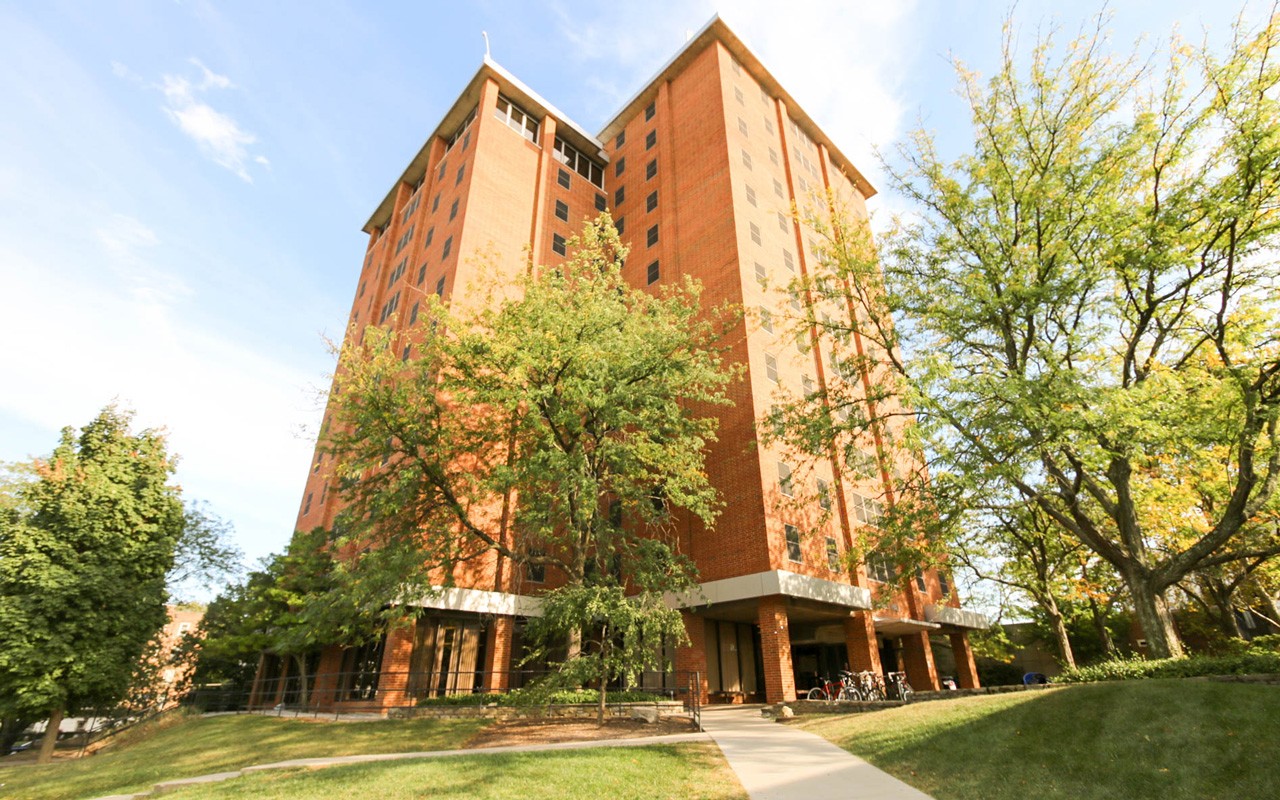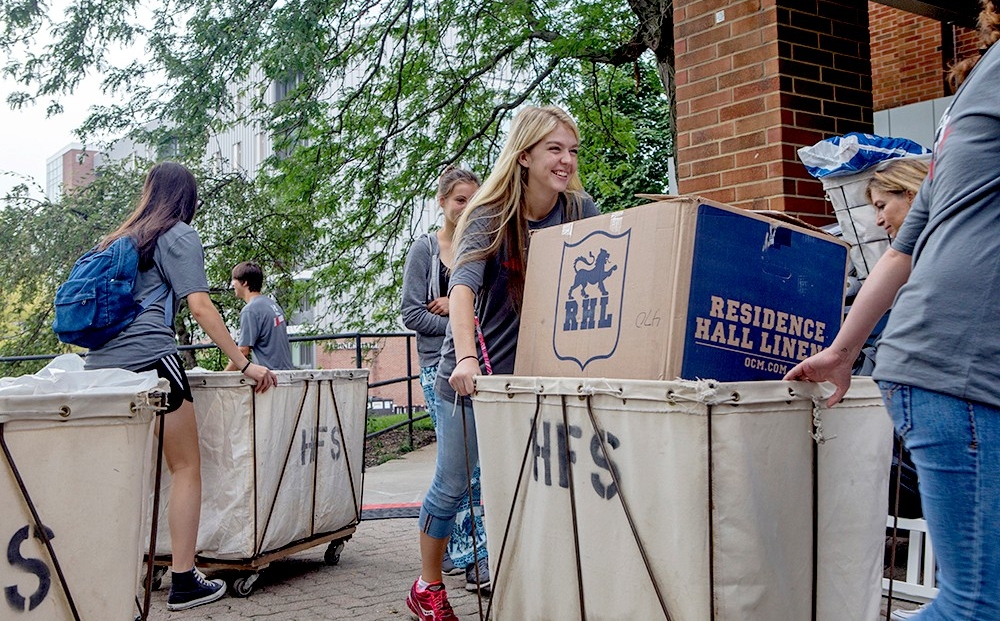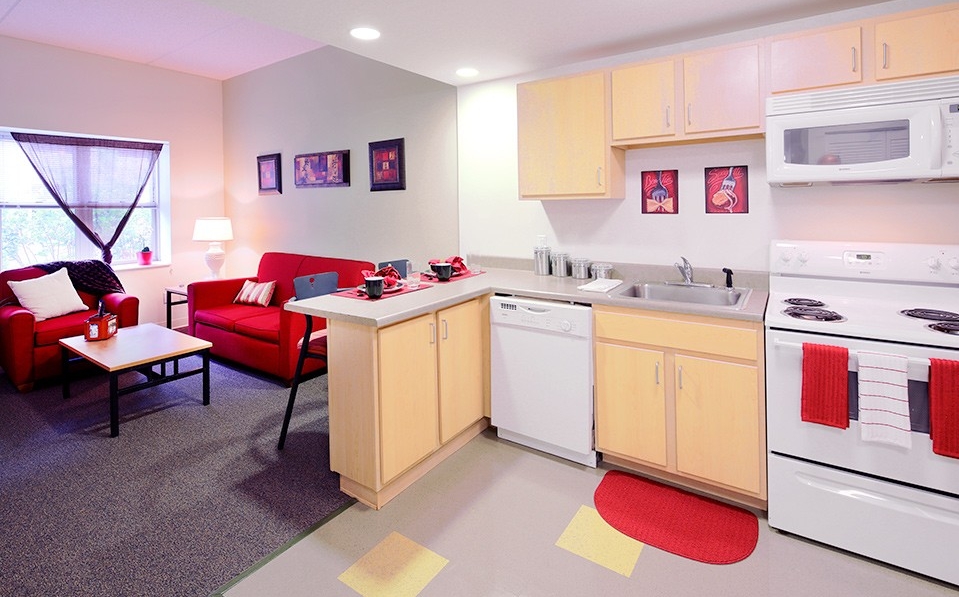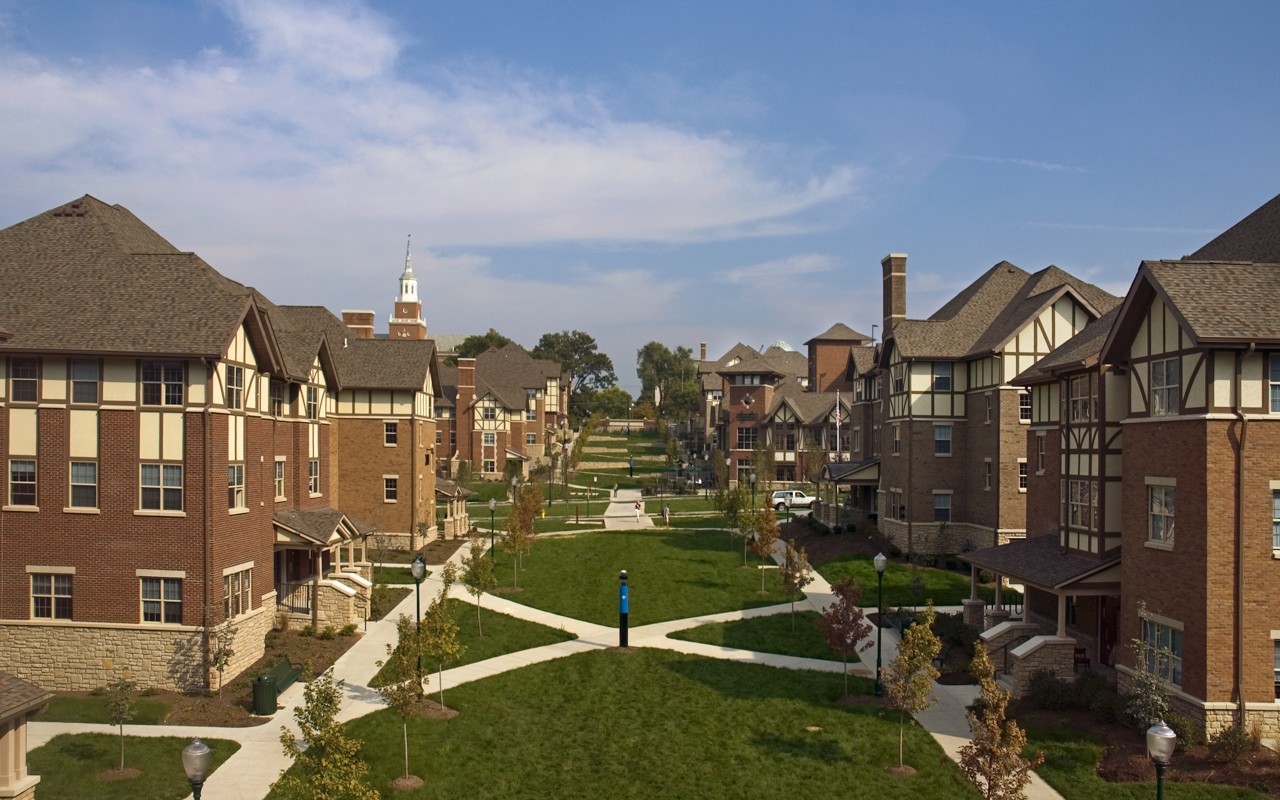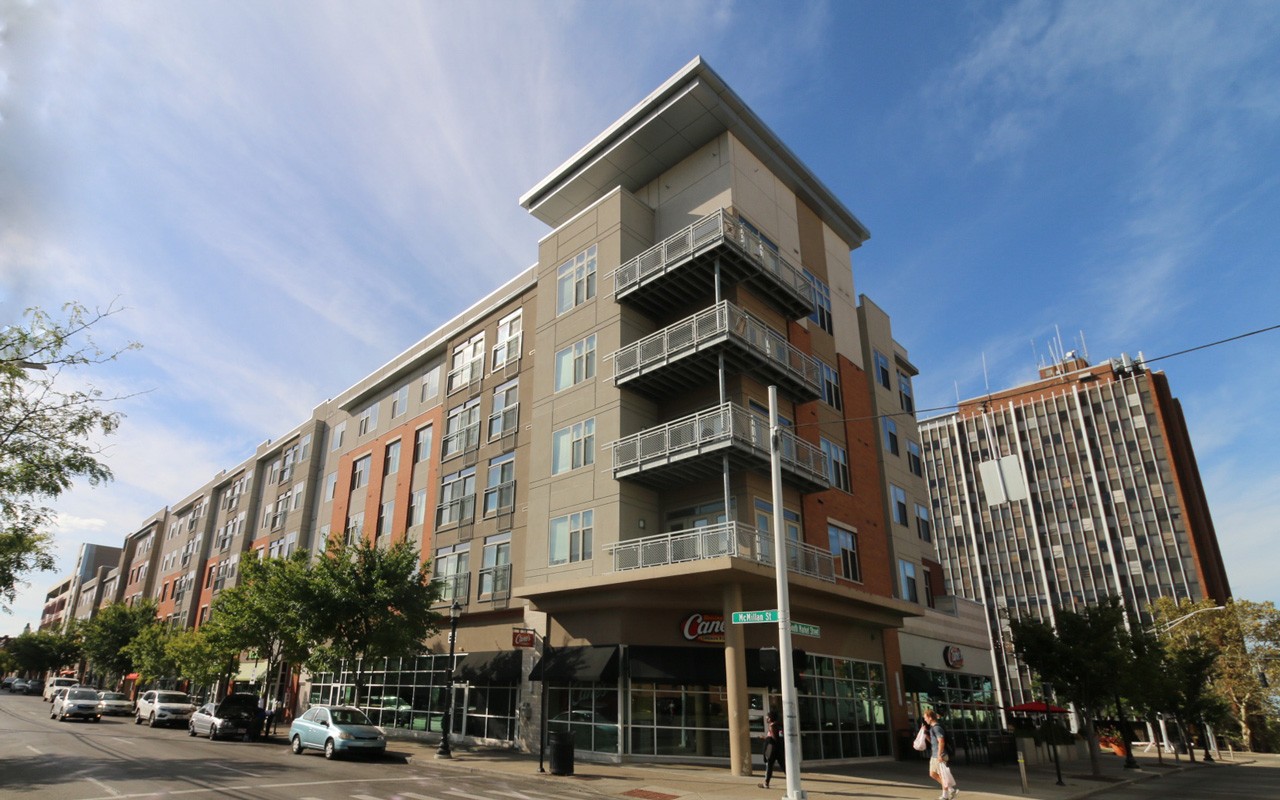
Everything you need to know about UC housing
UC’s director of housing Carl Dieso shares how to apply for, thrive in university housing
Living on campus in University of Cincinnati housing is an exciting decision for many students. Director of Housing Carl Dieso shares helpful tips for completing the process and making the most of the experience.
“The decision to live in university housing is an exciting one, but it can also be one that brings a little bit of anxiety because it's a new environment,” Dieso says. “We encourage students and their families to think about it in two parts. Part one is: What do I need to be successful? What kind of room do I want? What kind of study space or amenities help me be comfortable and do my best?
“The other part of that is introspective, thinking about what you can do as an individual to help those around you. And that's where the roommate environment and relationship comes into play. We encourage you not to spend time thinking about the external things you can't control, but start to define what you can, and make this the best experience you can for yourself.”
Tip:
Parents can stay updated about what information their students are getting from University Housing as they go through the phases of the application process. Copies of communications sent to new students will be posted online after they are sent to students. Learn more.
What is the process for housing this fall?
Students and their families will find a three-part process to apply for housing.
Step one is actually making the decision to live on campus, and that requires a housing application through our online portal.
Once you have accepted admission to the university, you can access the housing application. If you make the decision to live on campus, take action early. There's no reason to wait, because every day, new students are applying. We want to make sure you're in the best possible position to make a selection while all the spaces are available.
Applications are now open; May 3 is the priority deadline for submitting a housing application. Those who submit after this date are still eligible for housing, but may be subject to the waitlist process, and may not have the option to select their own room.
During the application phase, you will:
- Verify/submit general information
- Select your meal plan (an All-Access meal plan is required for first-year students)
- Review and sign the Housing Agreement
- Pay application fee (without payment, application is not considered complete and eligible for room selection)
Phase 2: Living-Learning Communities, roommate profile and roommate groups
In Phase 2, students will indicate their interest in a Living-Learning Community (LLC), if desired. Each LLC has its own criteria, and an application inside the Housing portal. Students should review the details of each LLC, and note the deadlines. Applications for LLCs are due by May 1, and notification of status will be sent by UC email by May 3. Applicants must accept or deny their LLC offer by May 6.
Room selection timeslot notification for LLCs will be sent to UC emails and selection will begin in mid-May.
Completing a roommate profile and roommate groups is another part of Phase 2. The roommate profile will help students find others who share interests, lifestyles, study habits and more. Forming roommate groups is an optional step. Profiles and groups may be edited at any time during Phase 2.
Learn more about roommates and tips for selecting them.
Phase 3: Room selection and move-in appointment
Next is the actual room selection and roommate matching process. That begins in May and runs through early summer. We'll invite students back into the portal, the same place where they signed up, and they'll be able to make a selection from all the available room spaces. As a requirement of that step, we do ask for students to be registered for orientation by that time of room selection.
Your room selection time slot notice will be sent to your university-issued email address late May/early June.
Important information for room selection:
- You must have a paid housing application and Bearcats Bound Orientation registration to be eligible for a room selection timeslot.
- Room selection period is throughout June-July.
- Time slots are determined by the week in which your application fee is paid.
The culmination of all the orientation activities in the room-selection process, families will actually select their day to move in. We have a reservation time slot system where students can pick their hall, their day, their hour, and have a dedicated time for our team to welcome them and help them get set up on campus.
Move-in can be a hectic time for you and your family, but when everyone moves in by appointment, it spreads out traffic congestion and makes the process go more smoothly.
More to know:
- You must reserve a move-in appointment late July/early August.
- Students will be notified via UC-issued email when the appointment scheduler opens.
- A Family Move-in Guide with complete details will be mailed to your permanent address on file in early August.
How does living in UC housing help students thrive?
Living in university housing is about opportunities for connection — to the community, to the academic environment and to the resources that are here on campus. We bring those resources to the residence hall and make sure students are educated about how to venture out from their hall and explore the world around them. We make sure students understand what it takes to be successful in the community, and that's driven by a team of professionals that live in housing and respond to students 24 hours a day.
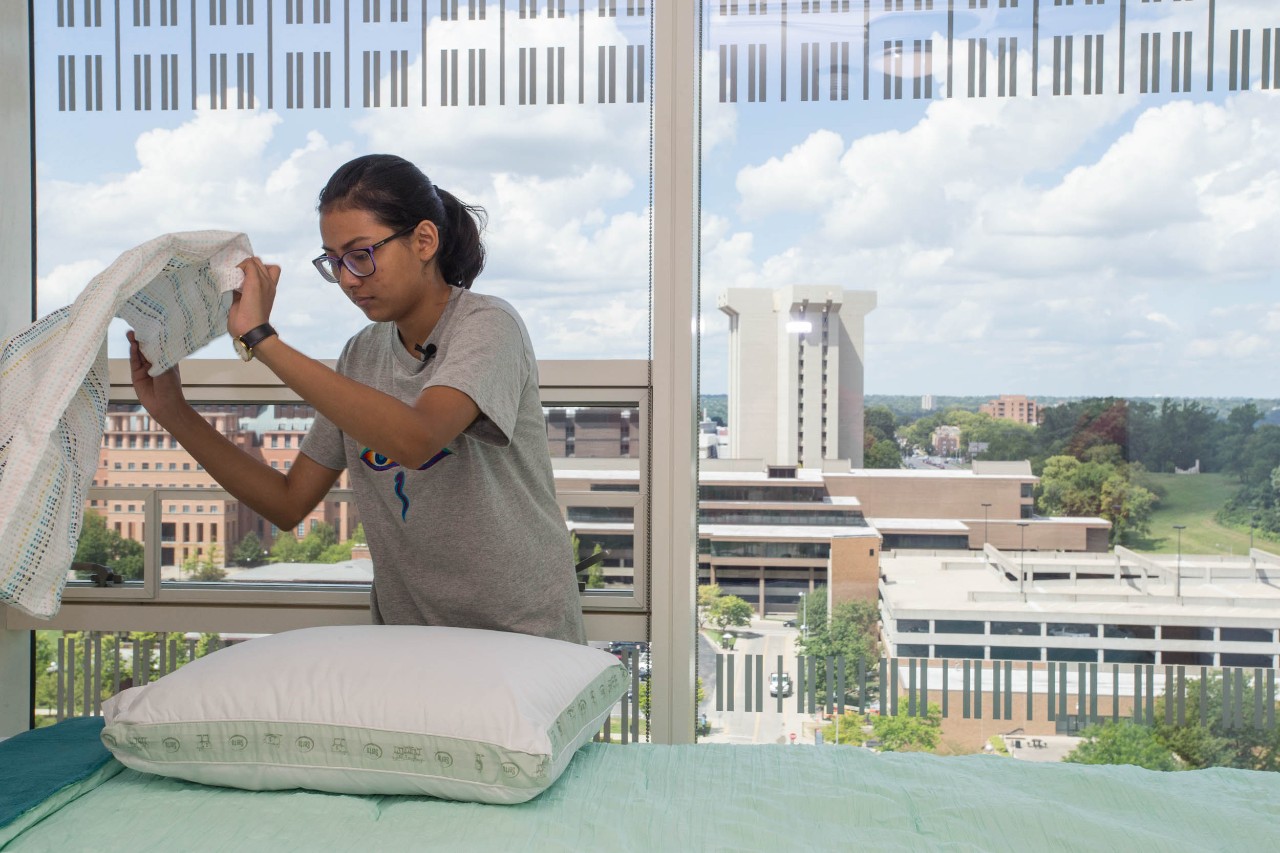
UC's high-rise residence halls like Scioto offer beautiful campus views. Photo/Andrew Higley/UC Creative + Brand
What should I know about living with roommates?
Having a roommate and living with others is a new experience for many of our students. A lot of our Bearcat community comes from homes where they may have their own bedroom, maybe even their own bathroom. So, we provide structure as students move into a community of 7,000 other Bearcats. What we do is provide structures to help them work through that.
It starts at a very simple level of making sure the students have their roommates’ contact information over the summer so they can start that dialogue: Is it OK to eat the last Pop-Tart? Who's taking out the trash? What time do you like to go to bed? Very basic things to understand how the rules are going to be in the room when they get together. We reinforce that with our residents and education development staff and, upon arrival, they help all our students and residents work through a roommate contract. It takes those conversations, those early agreements, and starts to document it so the rules are known and shared and discussed among the group.
Lastly, if things do escalate and get to a point where folks aren't able to agree, we work through a mediation process, and our team is there every step of the way to talk about opportunities to make change. And if not, how can we help them make change through different room assignments or other administrative actions — but many of our students never get to that point.
What are the benefits of random housing assignments?
While it may be tempting to live with your closest friends, that’s not always the best choice. We know from research that when students have a roommate that they've not met before, it's a first-time relationship when they come to the university, they're actually more open to try new things. Those individuals are more engaged with their fellow Bearcats, with their academic partners, with clubs and activities, which immediately leads to higher satisfaction. We see those students much happier around campus.
Some of the foundational work we do helps residents be successful. We ask our students to think about what they can personally do to make this a good experience. Coming in with the right mindset about how you can help that relationship be successful is important.
Once our students are committed and engaged to the community, that leads to satisfaction and success with academics, with retention and graduation rates, and for many of them, because they're open to those relationships and are honest to it, it leads to lifelong friendships.
What's the biggest misconception about campus housing?
One of the areas we find our students and families focus on a lot is finding the perfect room. The reality is, there is no perfect room. It's the right room at the right time for that student, and what they need one year could be a traditional residence hall and the next year, it could be an apartment. So that's why we encourage conversation: before you apply, before you select a room, to understand what it is you need to be successful this year.
Questions to consider:
- Am I comfortable sharing bathrooms with others? Do I need a private bathroom?
- Do I need a private bedroom?
- Do I need a study lounge on my floor or in my building?
- Do I want to be located in a particular corner of campus?
- Where are my classes going to be?
- How am I going to engage the community?
Understand what's important to you, and you can really make a good decision of where to live.
What other resources are there for students and families?
Review UC Housing resources and application FAQs.
Students and families may still have questions about whether it's the right time to live on campus, but I can assure you, our team takes it very seriously and is doing what's needed to make sure that we've got the right kind of housing at the right time for anybody that wants to be here.
We are currently working with our local health officials and our facilities and housekeeping professionals across campus, guided by our physician-led COVID Response Team and guidance from the CDC, and we've adjusted our operating protocols to meet those standards. That's routine cleanings, sanitizing stations, supplies and training for our students.
It's a partnership to make the community safer, and just like any other time here on campus, we do our part, and we look to students to make sure they're educated about what they need to do.
Featured image at top of Scioto Hall: Jay Yocis/UC Creative + Brand
Learn more about UC Housing
Find the latest news, resources and applications on the university housing website.
Browse all of UC's housing communities.
Related Stories
ADAAPT: Growing Student Ideas
December 19, 2024
Steven Doehler, an industrial design professor at the University of Cincinnati’s College of Design, Architecture, Art, and Planning (DAAP), says he prioritizes the entrepreneurial aspect of a student's design product – which led him to create HomeGrown Studio.
What happens when you give co-op students 90 minutes to make a...
December 19, 2024
UC DAAP students on co-op at the Rockwell Group, an architecture firm in Manhattan, are featured in a Wall Street Journal article about the firm's gingerbread house competition. Check out their gingerbread replica of UC's Crosley Tower.
Benefits of cooperative learning
Learn about the instructional method of cooperative learning, its definition, characteristics and benefits, as well as how it compares to cooperative education (co-op).


